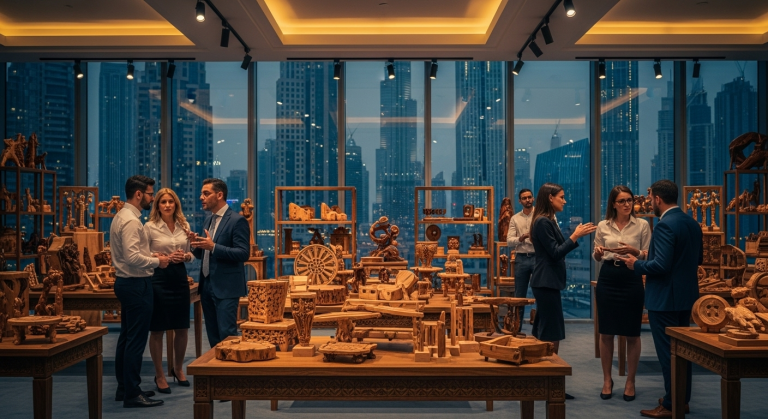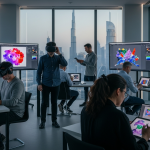Market Analysis and Opportunities
The United Arab Emirates, and Dubai in particular, represent a dynamic environment for niche manufacturing ventures such as handcrafted wooden product manufacturing. Driven by a robust tourism sector, a fast-growing population of affluent consumers, and a renewed focus on authenticity and sustainable luxury, the market presents strategic opportunities for entrepreneurs and investors. Understanding the landscape of business in Dubai is essential for securing a competitive foothold, making accurate UAE market analysis and insight-driven expansion strategies key to success.
Target Market Analysis
With Dubai’s population surpassing 3.5 million in 2024, and the wider UAE home to over 10 million residents (UAE Government Data), demand for personalized and premium products continues to grow. The market for handcrafted wooden products—ranging from bespoke furniture, high-end décor, eco-friendly kitchenware, to luxury gifting—mirrors the region’s appetite for exclusivity and craftsmanship.
- Market Size & Growth: The UAE’s home and office furniture sector was valued at over AED 13.7 billion in 2023 and is expected to grow at a CAGR of 6.5% through 2027 (Statista, UAE Ministry of Economy). This includes a rising share allocated to artisan and bespoke wooden items.
- Consumer Behavior: A 2023 Gulf News report highlighted increasing preference among Dubai’s residents and international visitors for sustainable, locally-made, and customizable products. Tourists, corporate clients, and property owners seek items that blend Middle Eastern design heritage with contemporary flair.
- Key Trends:
- Sustainability: Eco-friendly sourcing and manufacturing are valued by both private consumers and corporate buyers.
- Digital Transformation: Online showrooms, AR visualization, and e-commerce integration increase consumer engagement.
- “Heritage chic”: Fusion of traditional Emirati motifs with modern design is in high demand.
Marketing Needs
Handcrafted wooden product manufacturers in Dubai operate in a competitive environment where brand differentiation and digital presence are vital. A comprehensive marketing approach should include:
- Market Research: Ongoing consumer insights, trend monitoring, and competitor benchmarking are necessary—leveraging both digital analytics and customer feedback loops.
- Digital Marketing: Investing in SEO for keywords like “bespoke furniture in Dubai,” “eco-friendly home décor UAE,” and PPC campaigns targeting expatriate and premium segments. Social media engagement—particularly on Instagram, Facebook, and Pinterest—drives brand visibility.
- Branding: Developing a strong, cohesive visual identity rooted in both Middle Eastern culture and contemporary aesthetics. Storytelling (e.g., spotlighting artisans) strengthens brand loyalty.
Recommendations include leveraging influencer marketing with local interior designers, establishing pop-up collaborations at high-traffic malls and resorts, and showcasing work at relevant trade fairs.
Expansion Potential
Thanks to Dubai’s logistical advantages and international connectivity, handcrafted wooden product manufacturers can:
- Expand to New Segments: Target both B2C (high-net-worth residents, tourists) and B2B (luxury hotels, restaurants, office developers) with tailored offerings.
- Regional Scale-Up: Utilize Free Zone benefits to ship products to the wider GCC, capitalizing on rising demand in Saudi Arabia and Qatar.
- Diversification: Offer limited-edition product ranges, corporate gifting solutions, and install digital platforms for online customization/orders.
For investors, this translates into enticing scalability and the potential for export-driven revenue streams.
Comprehensive Business Overview
Handcrafted wooden product manufacturing in Dubai entails the design, crafting, and sale of premium wooden items using artisanal methods. This industry sits at the intersection of luxury manufacturing, sustainability, and design innovation.
Business Model
- Production: Locally sourced and/or responsibly imported hardwood, transformed into unique products via skilled labor, machinery, and technological augmentation (e.g., CNC, laser engraving).
- Sales Channels: Direct-to-consumer (online platforms, showrooms), B2B (contracts with hotels, offices), and via third-party retailers or distributors.
- Target Audience: Luxury consumers, property developers, hospitality brands, corporate gift buyers, tourists, and art collectors.
- Operational Scope: From boutique workshops serving local clients to scalable Free Zone-based operations with GCC and export reach.
Mission, Vision, and Core Objectives
- Mission: To craft distinctive, sustainable wooden products that celebrate cultural heritage while elevating modern interiors across the UAE and beyond.
- Vision: To become the leading provider of luxury handcrafted wooden products in Dubai, recognized for quality, design, and environmental stewardship.
- Core Objectives:
- Deliver exceptional craftsmanship and bespoke design services.
- Integrate sustainable sourcing and production practices.
- Establish a strong omni-channel presence in Dubai and the wider region.
Stage of Business & Location
Depending on the enterprise’s maturity:
- Startup or Growth: Most handcrafted wooden product businesses are in early-stage to growth phase, with significant expansion potential in the UAE context.
- Location: Dubai Free Zones (such as Dubai Design District and Jebel Ali Free Zone) offer tax incentives, simplified setup, and international trade advantages. Mainland registration grants access to a wider local market. Business Setup Services from local consultancies can help determine optimal jurisdiction.
Competitive Advantage
Unique Value Proposition (UVP)
Handcrafted wooden product manufacturing in Dubai holds several unique strengths:
- Entrepreneur Perspective:
- Low market saturation compared to mass-produced furniture, enabling niche positioning.
- Opportunity to personalize products, responding to high custom demand in the UAE.
- Investor Perspective:
- High margins due to exclusivity, low direct competition, and premium segment targeting.
- Strong recurring B2B opportunities with luxury real estate and hospitality industries.
- Government support for “Made in UAE” initiatives and sustainable manufacturing.
- Manager Perspective:
- Operational agility from small-batch, high-value production models.
- Ease of scaling (by increasing skilled artisans or digitizing production lines).
- Ability to leverage Dubai’s trade and logistics infrastructure for regional distribution.
Exclusive partnerships with local wood suppliers and hospitality groups, introduction of proprietary design patterns, or integration of digital customization (e.g., web-based configurators) further differentiate the business.
Financial and Investment Needs
Financial Requirements
Capital requirements for launching or expanding a handcrafted wooden product manufacturing business in Dubai include:
- Company Setup: AED 25,000–50,000 for Free Zone registration, legal documentation, initial licensing (Dubai DED or relevant Free Zone authority).
- Infrastructure: AED 100,000–300,000 for workshop equipment (CNC, carpentry tools, finishing machinery), digital IT systems, and rental deposits (costs vary by district—Dubai Design District, Al Quoz, JAFZA, etc.).
- Staffing: AED 150,000–250,000 for first-year salaries and visas (for artisans, designers, sales/admin).
- Marketing and Brand Development: AED 75,000–150,000 for initial launch, digital presence, and campaign costs.
- Working Capital: AED 100,000–200,000 to cover inventory, operational expenses, and contingencies.
Total estimated initial outlay: AED 450,000–950,000+ based on scale and ambition.
Investment Potential
Dubai’s growing premium and sustainability markets ensure a strong investment case:
- ROI Potential: Exclusive, bespoke manufacturers may reach profit margins of 20–40% after initial ramp-up (industry average, UAE Ministry of Economy).
- Investment Models:
- Equity investment for long-term growth partners.
- Convertible notes or venture capital for startups with innovative technology or export potential.
- Debt financing for established businesses expanding production capacity.
For bespoke investment advice, consult investment consulting services tailored to the UAE landscape.
Financial Risks and Mitigation
Key risks include:
- High Setup Costs: Mitigated by phased investment, co-working manufacturing spaces, or leasing equipment.
- Cash Flow Challenges: Addressed through staggered payment terms, building recurring B2B contracts, and securing upfront deposits.
- Currency Fluctuations: Minimized by invoicing in AED and hedging for import/export operations.
- Supply Chain Disruptions: Diversifying supplier base and maintaining buffer inventory helps reduce delays.
Insurance, robust legal contracts, and clear focus on financial controls are advised.
Human Resources and Recruitment
Workforce Needs
To succeed, businesses require a blend of craftsmanship and business acumen. Typical workforce structure:
- Artisans and Carpenters: 3–8 full-time staff depending on workshop size.
- Designers (Interior/Product): 1–3 specialists.
- Sales and Marketing Professionals: 1–2, focused on digital/social/customer experience.
- Operations and Administration: 2–3 including office admin, procurement, and logistics.
Skilled labor in the UAE often comes from India, the Philippines, and local Emirati talent pools.
HR Challenges and Solutions
Attracting and retaining top talent is challenging amid Dubai’s competitive wage environment:
- Offer competitive wages, benefits, and clear career paths.
- Invest in artisan training programs and design apprenticeships.
- Reward innovation and craftsmanship with bonuses or recognition.
- Utilize recruitment consultancies specializing in the manufacturing and luxury sectors.
Compliance with UAE Labor Laws
Businesses must strictly adhere to UAE laws regarding employment contracts, labor visas, working hours, occupational health, and end-of-service gratuities. Regular audits, clear HR policies, and leveraging residency and citizenship services can streamline compliance and staff renewal processes.
Infrastructure and Operations
Infrastructure Needs
- Physical Premises: Workshops (150–400 sqm), preferably in light industrial zones or Free Zone facilities for cost efficiency.
- Office Space: Co-working solutions or smaller offices adjacent to workshops for administration and design teams.
- Technology: Investment in ERP systems, cloud storage, e-commerce integration, and possibly AR/VR visualization for clients.
Operational Optimization
Common weaknesses in operations include fragmented supply chains, manual processes, and lack of inventory oversight. Actionable solutions:
- Adopt ERP and inventory management solutions tailored for small manufacturing.
- Automate ordering and scheduling to streamline procurement and production cycles.
- Implement lean manufacturing techniques for higher efficiency and reduced waste.
Legal Compliance
Legal requirements in Dubai include:
- Company registration (DED or Free Zone authority).
- Acquisition of a trade or manufacturing license.
- Corporate bank account setup.
Regular compliance checks and consultation with specialized business setup services help avoid regulatory lapses.
Innovation and Technology
The sector benefits from embracing:
- AR/VR platforms for online product visualization.
- CNC and laser engraving for modern and precise designs.
- E-commerce portals with customization options.
Further digitization, such as integrating blockchain for supply chain transparency, supports differentiation and trust in luxury markets.
Marketing and Branding Strategies
Brand Status and Market Positioning
Handcrafted wooden product manufacturing appeals to a sophisticated clientele. To elevate brand status:
- Develop strong, culturally resonant visual identity (logo, brand story, product packaging).
- Position as eco-conscious, authentic, and luxury—backed by PR in local business media (industry news and stories can build credibility).
Marketing Channels
Current best practices include:
- Digital Marketing: SEO, Google Ads, and social media for awareness and lead generation.
- Traditional Media: Feature stories in design magazines, collaborations with luxury property developers, and in-person exhibitions at trade shows.
- Optimization: Continuous A/B testing for messaging and content, leveraging analytics to refine targeting.
360-Degree Campaigns
Effective multi-channel campaigns might include:
- Influencer partnerships—working with Emirati designers and international décor influencers.
- Email newsletters featuring design inspiration and exclusive product launches.
- Pop-up events in luxury hotels or major shopping malls to engage tourists and residents.
Regularly refreshed content on a dedicated business blog supports ongoing brand engagement and boosts SEO.
Growth and Development Potential
Growth Strategies
Potential for growth includes:
- Expanding product lines—e.g., introducing “smart” home accessories or eco-friendly office sets.
- Forming strategic partnerships with real estate developers, luxury hotels, and design studios.
- Leveraging digital marketplaces (Amazon UAE, Noon.com) for regional and international sales exposure.
Networking
Relationships with suppliers, logistics providers, and local authorities streamline operations and open up collaborative opportunities. Plugging into networks like the Persian Horizon’s 57-country affiliation can facilitate both supply chain and export growth.
International Potential
Dubai acts as a global gateway, enabling handcrafted wooden product manufacturers to access the wider Middle East, Africa, and Europe via established logistics hubs. The city’s free zones and trade agreements make cross-border expansion straightforward once the brand is established locally.
Sustainability and Innovation
Increasingly, Dubai’s Vision 2030 prioritizes sustainability and innovation. Initiatives to consider:
- Sourcing certified or recycled wood for production.
- Implementing energy-efficient manufacturing processes.
- Launching “Green Product” lines with transparent sourcing and circular design principles.
These moves not only align with national objectives but are increasingly demanded by eco-conscious consumers.
Alignment with Dubai’s Market
Cultural Alignment
Dubai’s cosmopolitan environment encourages multicultural brand narratives. Success depends on:
- Infusing local aesthetics (Arabic calligraphy, geometric patterns) into contemporary designs.
- Offering personalization services to cater to diverse cultural preferences.
- Creating bilingual (Arabic/English) marketing and e-commerce platforms for wider appeal.
Local Regulatory Compliance
Regulatory compliance involves adherence to:
- Commercial and trade licensing standards.
- VAT and tax reporting (as regulated by UAE Federal Tax Authority).
- Environmental and health safety regulations.
Partnering with legal advisors and business consultants ensures ongoing alignment and rapid adaptation to regulatory updates.
Advantages of Dubai
Handcrafted wooden product manufacturing directly benefits from:
- Tax-free incentives in Free Zones.
- Access to world-class infrastructure and international shipping facilities.
- Robust support for SMEs and manufacturing ventures from local authorities.
- The city’s status as a global design, tourism, and trade destination.
Local Challenges and Practical Solutions
Key challenges and recommended approaches include:
- High Competition: Invest in product differentiation through design, quality, and customer experience.
- Operational Costs: Reduce overhead by sharing manufacturing spaces or pursuing government incentives for innovative manufacturing.
- Market Entry Barriers: Leverage business buying services to enter the market via acquisition of existing entities.
- Talent Retention: Foster company culture, mentorship programs, and competitive compensation to retain skilled artisans.
Conclusion
Dubai’s compelling mix of affluence, cultural diversity, and global connectedness creates an auspicious environment for handcrafted wooden product manufacturing. Unique value lies in blending artisanal heritage with innovative design and sustainability, catering to both discerning locals and international clients. With solid market demand, government support, and well-defined operational strategies, stakeholders can unlock substantial returns on investment in Dubai’s vibrant business landscape.
Actionable Recommendations
- Conduct robust UAE market analysis and consumer research prior to launch.
- Invest in digital transformation—both for manufacturing efficiency and customer experience.
- Align product range and brand story with Dubai’s multicultural and luxury markets.
- Partner with experienced business consulting firms like Persian Horizon for business setup, expansion, and investment guidance.
- Continuously iterate product offerings to reflect emerging trends in sustainability and design.
Ready to build or scale a handcrafted wooden product business in Dubai?
Explore specialized support—from business setup to investment consulting and international networking—through Persian Horizon’s comprehensive services and maximize your business opportunities in the UAE market.







